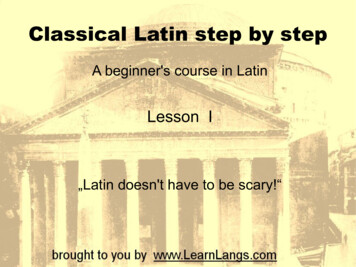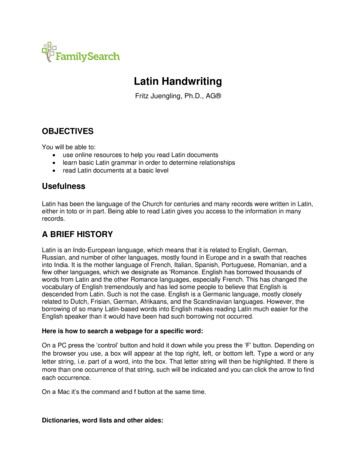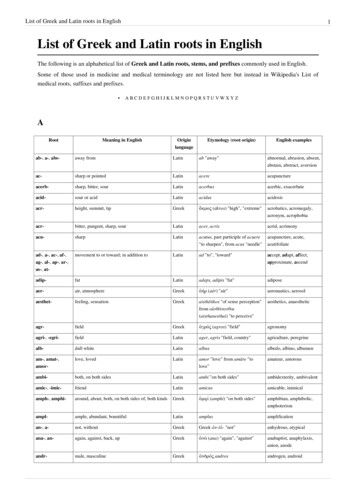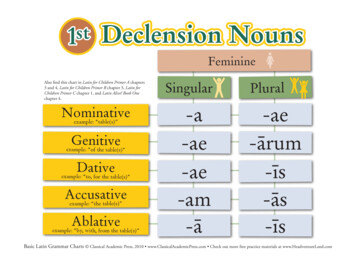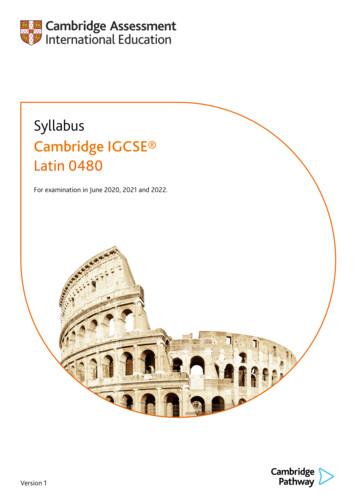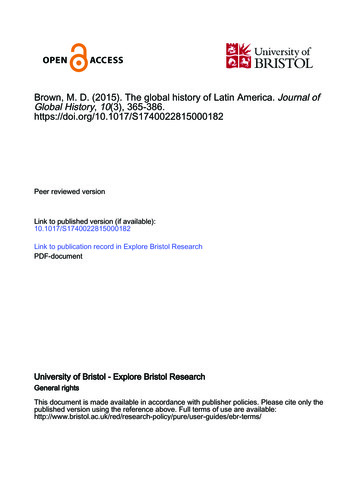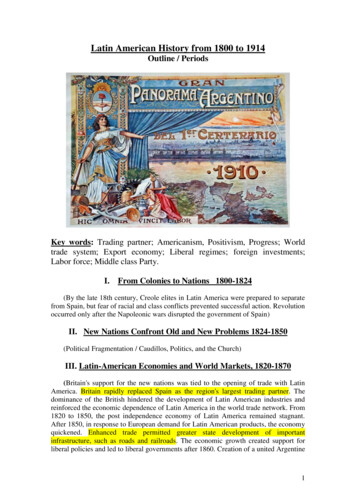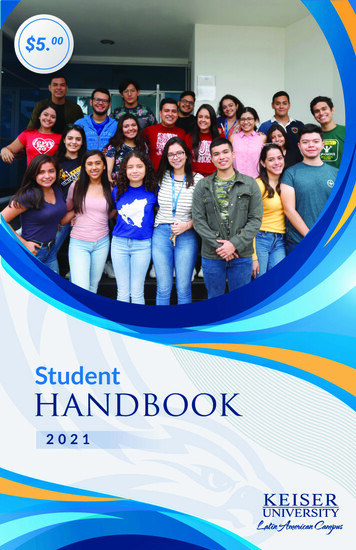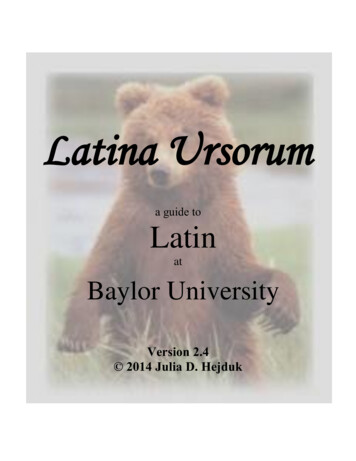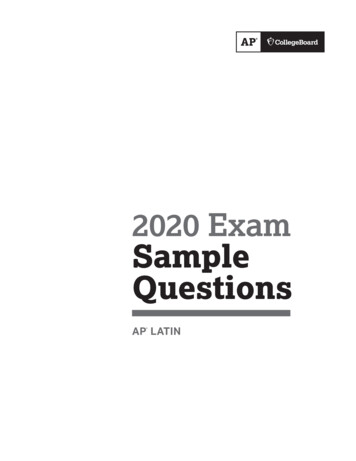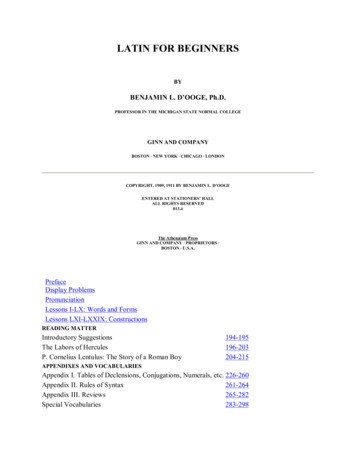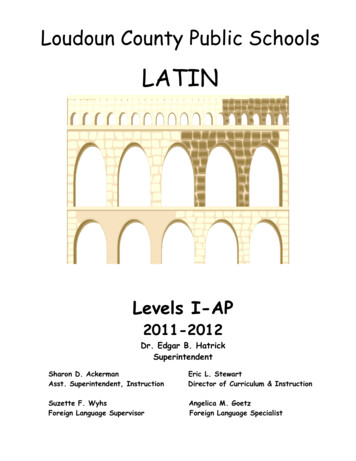
Transcription
Loudoun County Public SchoolsLATINLevels I-AP2011-2012Dr. Edgar B. HatrickSuperintendentSharon D. AckermanAsst. Superintendent, InstructionEric L. StewartDirector of Curriculum & InstructionSuzette F. WyhsForeign Language SupervisorAngelica M. GoetzForeign Language Specialist
1 of 67ACKNOWLEDGEMENTSThe following middle and high school teachers assisted in the development of theLatin curriculum that reflects national and state standards.TEACHERLaura Newell*Amy GoldOdessa AspAndrea WeiskopfLynn Krepich*Paul PerrotMarianne PagosMichael Krepich*Beth McGinleyHilary Hultman-LeeKristen KlipferMichelle LindoWes Driskill*Denotes Curriculum Leader’sSCHOOLStone BridgeLunsfordTuscarora/HeritageRiver Bend/SenecaLoudoun CountyPotomac Falls/Park ViewPark View/Potomac FallsLoudoun ValleyBroad RunPotomac FallsFreedomBriar WoodsHeritage
2 of 67Table of ContentsTopicPageLatin I curriculum3Latin II curriculum16Latin III curriculum25Latin IV curriculum38Latin V51Latin AP curriculum58
3 of 67Latin I
4 of 67LCPS LATIN I CURRICULUM SY 2011-2012Recommended # of Lessons:Stage 1: Caecilius5Quarter 1TOPIC: Roman family lifeState Standards: LI.1 The student will understand simple written Latin texts about a variety of topics.LI.2 The student will use Latin orally and listen to and write Latin as part of the language-learning process.LI.3 The student will develop an awareness of perspectives, practices, and products of Roman culture.LI.4 The student will recognize that perspectives, practices, and products of Roman culture are interrelated.LI.5 The student will connect information about the Latin language and Roman culture with concepts studied in other subjectareas.LI.6 The student will demonstrate understanding of the significance of culture through comparisons between Roman culture andthe cultures of the United States.LI.7 The student will compare basic elements of the Latin language to those of the English language.LI.8 The student will explore situations in which to apply Latin language skills and cultural knowledge beyond the classroomsetting for recreational educational and occupational ES Roman Family and nomenclature Roman House Basic architecture terms, e.g. arch, basilica, columns, vault,concrete, post and lintel Alphabet, pronunciation, and diphthongsUSEFUL AL KNOWLEDGE(facts and skills) Basic grammatical terms - parts of speech, syntax, macron,inflection, declension, conjugation, gender, number, case Vocative case for declensions 1-3 Indicative and Imperative moodātrium, ātriī, n.; canis, canis, m. or f.; coquus, coquī, m.; cubiculum, cubiculī, n.; culīna, culīnae, f.;fīlius, fīliī, m.; hortus, hortī, m.; in (with ablative); labōrō, labōrāre, labōrāvī, labōrātum; māter,mātris, f.; pater, patris, m.; sedeō, sedēre, sēdi, sessum; servus, servī, m.; tablīnum, tablīnī, n.;triclīnium, triclīniī, n.; via, viae, f.; Culture: ianua, compluvium, impluvium, lararium, insulae,i liEnglish derivatives and cognatesOral Latin, phrases, mottoes, quotes, proverbs, abbreviationsRESOURCES/ACTIVITIESActivity Master worksheets from publisher, textbook stories and questions, student workbook,additional activities from VISION site, CLC website, Amsco book seriesASSESSMENTS/RUBRICSformative and summative assessments (from resources or teacher-created), such as tests, quizzes,projects, etc.
5 of 67LCPS LATIN I CURRICULUM SY 2011-2012Stage 2: in villaRecommended # of Lessons:5Quarter 1TOPIC: Roman daily lifeState Standards: LI.1 The student will understand simple written Latin texts about a variety of topics.LI.2 The student will use Latin orally and listen to and write Latin as part of the language-learning process.LI.3 The student will develop an awareness of perspectives, practices, and products of Roman culture.LI.4 The student will recognize that perspectives, practices, and products of Roman culture are interrelated.LI.5 The student will connect information about the Latin language and Roman culture with concepts studied in other subjectareas.LI.6 The student will demonstrate understanding of the significance of culture through comparisons between Roman culture andthe cultures of the United States.LI.7 The student will compare basic elements of the Latin language to those of the English language.LI.8 The student will explore situations in which to apply Latin language skills and cultural knowledge beyond the classroomsetting for recreational educational and occupational ES Roman Food and Dining Daily life: patron/client relationship ClothingUSEFUL VOCABULARYESSENTIAL KNOWLEDGE(facts and skills) Nominative and Accusative cases for declensions 1-3 Adjectives and Substantivesamīcus, amīcī, m.; ancilla, ancillae, f.; cēna, cēnae, f.; cibus, cibī, m.; dominus, dominī, m.; dormiō,dormīre, dormīvī, dormītum; gustō, gustāre, gustāvī, gustātum; intrō, intrāre, intrāvī, intrātum;laetus, laeta, laetum (1st and 2nd decl. adj.); laudō, laudāre, laudāvī, laudātum; mēnsa, mēnsae, f.;mercātor, mercātōris, m.; quoque (adv.); salūtō, salūtāre, salūtāvī, salūtātum; toga, togae, f.; tunica,tunicae, f.; Culture: stola, palla, cena, mensa, salutatio, cliens, patronusRECYCLED/ONGOINGTOPICS/STRUCTURESEnglish derivatives and cognatesOral Latin, phrases, mottoes, quotes, proverbs, abbreviationsRESOURCES/ACTIVITIESActivity Master worksheets from publisher, textbook stories and questions, student workbook,additional activities from VISION site, CLC website, Amsco book seriesASSESSMENTS/RUBRICSformative and summative assessments (from resources or teacher-created), such as tests, quizzes,projects, etc.
6 of 67LCPS LATIN I CURRICULUM SY 2011-2012Recommended # of Lessons:Stage 3: negotium5Quarter 1TOPIC: PompeiiState Standards: LI.1 The student will understand simple written Latin texts about a variety of topics.LI.2 The student will use Latin orally and listen to and write Latin as part of the language-learning process.LI.3 The student will develop an awareness of perspectives, practices, and products of Roman culture.LI.4 The student will recognize that perspectives, practices, and products of Roman culture are interrelated.LI.5 The student will connect information about the Latin language and Roman culture with concepts studied in other subjectareas.LI.6 The student will demonstrate understanding of the significance of culture through comparisons between Roman culture andthe cultures of the United States.LI.7 The student will compare basic elements of the Latin language to those of the English language.LI.8 The student will explore situations in which to apply Latin language skills and cultural knowledge beyond the NITIESfti l d ti l dti lESSENTIAL KNOWLEDGE(facts and skills) Town of Pompeii Present tense with 3rd person singular Question words: ubi, quis, quidUSEFUL VOCABULARYad (with accusative); bibō, bibere, bibī,; circumspectō, circumspectāre, circumspectāvī,; clāmō,clāmāre, clāmāvī, clāmātum; ecce!; et; exeō, exīre, exiī, exitum; exspectō, exspectāre, exspectāvī,exspectātum; forum, forī, n.; iānua, iānuae, f.; īrātus, īrāta, īrātum; leō, leōnis, m.; magnus, magna,magnum; nāvis, nāvis, f.; nōn; portō, portāre, portāvī, portātum; respondeō, respondēre, respondī,respōnsum; rīdeō, rīdēre, rīsī, rīsum; salvē! ; surgō, surgere, surrexī, surrectum; taberna, tabernae, f.;videō, vidēre, vīdī, vīsum; vīlla, vīllae, f.; vīnum, vīnī, n.RECYCLED/ONGOINGTOPICS/STRUCTURESEnglish derivatives and cognatesOral Latin, phrases, mottoes, quotes, proverbs, abbreviationsRESOURCES/ACTIVITIESActivity Master worksheets from publisher, textbook stories and questions, student workbook,additional activities from VISION site, CLC website, Amsco book seriesASSESSMENTS/RUBRICSformative and summative assessments (from resources or teacher-created), such as tests, quizzes,projects, etc.; Stage must be completed before administering Quarter 1 PALS.
7 of 67LCPS LATIN I CURRICULUM SY 2011-2012Recommended # of Lessons:Stage 4: in foro5Quarter 2TOPIC: forumState Standards: LI.1 The student will understand simple written Latin texts about a variety of topics.LI.2 The student will use Latin orally and listen to and write Latin as part of the language-learning process.LI.3 The student will develop an awareness of perspectives, practices, and products of Roman culture.LI.4 The student will recognize that perspectives, practices, and products of Roman culture are interrelated.LI.5 The student will connect information about the Latin language and Roman culture with concepts studied in other subject areas.LI.6 The student will demonstrate understanding of the significance of culture through comparisons between Roman culture andthe cultures of the United States.LI.7 The student will compare basic elements of the Latin language to those of the English language.LI.8 The student will explore situations in which to apply Latin language skills and cultural knowledge beyond the classroomsetting for recreational, educational, and occupational IES Forum Mythology: creation, Titans, Olympian deities, Greco-Romannames, domains and symbols, prominent myths associated withthemESSENTIAL KNOWLEDGE(facts and skills) Present tense with pronouns ego and tū, 3rd person pluralUSEFUL VOCABULARYagō, agere, ēgī, āctum; ānulus, ānulī, m.; cēra, cērae, f.; coquō, coquere, coxī, coctum; cūr; ē, ex(with ablative); ego; ēheu!; habeō, habēre, habuī, habitum; inquit; iūdex, iūdicis, m.; mendāx,mendācis, m.; pecūnia, pecūniae, f.; perterritus, perterrita, perterritum; poēta, poētae, m.; quaerō,quaerere, quaesīvī, quaesītum; quid?; quis?; reddō, reddere, reddidī, reditum; satis; sed; signum,signī, n.; sum, esse, fuī, futūrus; tū; vēndō, vēndere, vēndidī, vēnditum; vocō, vocāre, vocāvī,vocātum; Culture: basilica, duoviri, laresRECYCLED/ONGOINGTOPICS/STRUCTURESEnglish derivatives and cognatesOral Latin, phrases, mottoes, quotes, proverbs, abbreviationsRESOURCES/ACTIVITIESActivity Master worksheets from publisher, textbook stories and questions, student workbook,additional activities from VISION site, CLC website, Amsco book seriesASSESSMENTS/RUBRICSformative and summative assessments (from resources or teacher-created), such as tests, quizzes,projects, etc.
8 of 67LCPS LATIN I CURRICULUM SY 2011-2012Recommended # of Lessons:Stage 5: in theatro5Quarter 2TOPIC: theaterState Standards: LI.1 The student will understand simple written Latin texts about a variety of topics.LI.2 The student will use Latin orally and listen to and write Latin as part of the language-learning process.LI.3 The student will develop an awareness of perspectives, practices, and products of Roman culture.LI.4 The student will recognize that perspectives, practices, and products of Roman culture are interrelated.LI.5 The student will connect information about the Latin language and Roman culture with concepts studied in other subjectareas.LI.6 The student will demonstrate understanding of the significance of culture through comparisons between Roman culture andthe cultures of the United States.LI.7 The student will compare basic elements of the Latin language to those of the English language.LI.8 The student will explore situations in which to apply Latin language skills and cultural knowledge beyond the NITIESfti l d ti l dti lESSENTIAL KNOWLEDGE(facts and skills) Theater (drama) Adverbs as a part of speech Prepositional phrases using accusative and ablative cases(place where, place from which, place to which,accompaniment)USEFUL VOCABULARYadsum, adesse, adfuī, adfutūrus; agricola, agricolae, m.; ambulō, ambulāre, ambulāvī, ambulātum;audiō, audīre, audīvī, audītum; clāmor, clāmōris, m.; contendō, contendere, contendī, contentum;currō, currere, cucurrī, cursum; euge!; fābula, fābulae, f.; fābulam agō; fēmina, fēminae, f.; hodiē;iuvenis, iuvenis, m.; meus, mea, meum; multus, multa, multum; optimus, optima, optimum; petō,petere, petīvī, petītum; plaudō, plaudere, plausī, plausum; puella, puellae, f.; senex, senis, m.; spectō,spectāre, spectāvī, spectātum; stō, stāre, stetī, stātum; turba, turbae, f.; ubi?; urbs, urbis, f.; veniō,venīre, vēnī, ventum; Culture: cavea, scaena, orchestraRECYCLED/ONGOINGTOPICS/STRUCTURESEnglish derivatives and cognatesOral Latin, phrases, mottoes, quotes, proverbs, abbreviationsRESOURCES/ACTIVITIESActivity Master worksheets from publisher, textbook stories and questions, student workbook,additional activities from VISION site, CLC website, Amsco book seriesASSESSMENTS/RUBRICSformative and summative assessments (from resources or teacher-created), such as tests, quizzes,projects, etc.
9 of 67LCPS LATIN I CURRICULUM SY 2011-2012Recommended # of Lessons:Stage 6: Felix5Quarter 2TOPIC: slaves and freemenState Standards: LI.1 The student will understand simple written Latin texts about a variety of topics.LI.2 The student will use Latin orally and listen to and write Latin as part of the language-learning process.LI.3 The student will develop an awareness of perspectives, practices, and products of Roman culture.LI.4 The student will recognize that perspectives, practices, and products of Roman culture are interrelated.LI.5 The student will connect information about the Latin language and Roman culture with concepts studied in other subject areas.LI.6 The student will demonstrate understanding of the significance of culture through comparisons between Roman culture andthe cultures of the United States.LI.7 The student will compare basic elements of the Latin language to those of the English language.LI.8 The student will explore situations in which to apply Latin language skills and cultural knowledge beyond the classroomsetting for recreational, educational, and occupational IES Slaves and FreedmenESSENTIAL KNOWLEDGE(facts and skills) Imperfect and perfect tense of regular verbs and sum Latin Numbers and Numerals 1-20, 50, 100, 1000 Addition and Subtraction of Latin Numbers and Romannumerals Question words: cūr, quōmodo, quotUSEFUL VOCABULARYabsum, abesse, āfuī, āfutūrus; avārus, avārī, m.; bonus, bona, bonum; emō, emere, ēmī, emptum;ferōciter; festīnō, festīnāre, festīnāvī, festīnātum; fortis, forte; fūr, fūris, m.; īnfāns, īnfantis, m. or f.;intentē; lībertus, lībertī, m.; ōlim; parvus, parva, parvum; per (with accusative); postquam; pulsō,pulsāre, pulsāvī, pulsātum; quod; rēs, reī, f.; scrībō, scrībere, scrīpsī, scrīptum; subitō; superō,superāre, superāvī, superātum; tum; tuus, tua, tuum; vituperō, vituperāre, vituperāvī, vituperātum;Culture: familia, vernae, alumni, peculium, manumissio, libertusRECYCLED/ONGOINGTOPICS/STRUCTURESEnglish derivatives and cognatesOral Latin, phrases, mottoes, quotes, proverbs, abbreviationsRESOURCES/ACTIVITIESActivity Master worksheets from publisher, textbook stories and questions, student workbook,additional activities from VISION site, CLC website, Amsco book seriesASSESSMENTS/RUBRICSformative and summative assessments (from resources or teacher-created), such as tests, quizzes,projects, etc.; Stage must be completed before administering Quarter 2 PALS and midterm.
10 of 67LCPS LATIN I CURRICULUM SY 2011-2012Recommended # of Lessons:Stage 7: cena5Quarter 3TOPIC: Roman superstitionsState Standards: LI.1 The student will understand simple written Latin texts about a variety of topics.LI.2 The student will use Latin orally and listen to and write Latin as part of the language-learning process.LI.3 The student will develop an awareness of perspectives, practices, and products of Roman culture.LI.4 The student will recognize that perspectives, practices, and products of Roman culture are interrelated.LI.5 The student will connect information about the Latin language and Roman culture with concepts studied in other subjectareas.LI.6 The student will demonstrate understanding of the significance of culture through comparisons between Roman culture andthe cultures of the United States.LI.7 The student will compare basic elements of the Latin language to those of the English language.LI.8 The student will explore situations in which to apply Latin language skills and cultural knowledge beyond the IES Roman Death and Funerals Roman foundation myth Troy and AeneasESSENTIAL KNOWLEDGE(facts and skills) Adjective agreement: gender, number and case fordeclensions 1-3 Perfect tense stems without “v”USEFUL VOCABULARYcēnō, cēnāre, cēnāvī, cēnātum; centuriō, centuriōnis, m.; cōnspiciō, cōnspicere, cōnspexī,cōnspectum; cum (with ablative); faciō, facere, fēcī, factum; heri; ingēns, ingentis (genitive);intellegō, intellegere, intellexī, intellectum; lacrimō, lacrimāre, lacrimāvī, lacrimātum; mortuus,mortua, mortuum; nārrō, nārrāre, nārrāvī, nārrātum; necō, necāre, necāvī, necātum; Nihil, n.; omnis,omne; parō, parāre, parāvī, parātum; pestis, pestis, f.; pōculum, pōculī, n.; prōcēdō, prōcēdere,prōcessī, prōcessum; prope (with accusative); pulcher, pulchra, pulchrum; rogō, rogāre, rogāvī,rogātum; tacitē; tamen; terreo, terrēre, terrui, territum; umbra, umbrae, f.; valdē; Culture: mosaic,Elysian fields, Epicurus, Tartarus,RECYCLED/ONGOINGTOPICS/STRUCTURESEnglish derivatives and cognatesOral Latin, phrases, mottoes, quotes, proverbs, abbreviationsRESOURCES/ACTIVITIESActivity Master worksheets from publisher, textbook stories and questions, student workbook,additional activities from VISION site, CLC website, Amsco book seriesASSESSMENTS/RUBRICSformative and summative assessments (from resources or teacher-created), such as tests, quizzes,projects, etc.
11 of 67LCPS LATIN I CURRICULUM SY 2011-2012Recommended # of Lessons:Stage 8: Gladiatores5Quarter 3TOPIC: gladiatorsState Standards: LI.1 The student will understand simple written Latin texts about a variety of topics.LI.2 The student will use Latin orally and listen to and write Latin as part of the language-learning process.LI.3 The student will develop an awareness of perspectives, practices, and products of Roman culture.LI.4 The student will recognize that perspectives, practices, and products of Roman culture are interrelated.LI.5 The student will connect information about the Latin language and Roman culture with concepts studied in other subjectareas.LI.6 The student will demonstrate understanding of the significance of culture through comparisons between Roman culture andthe cultures of the United States.LI.7 The student will compare basic elements of the Latin language to those of the English language.LI.8 The student will explore situations in which to apply Latin language skills and cultural knowledge beyond the classroomsettingfor recreational educational and occupational ESESSENTIAL KNOWLEDGE(facts and skills) Gladiatorial shows Three major Roman historical time periods: Monarchy,Republic and Empire Superlative degree of adjectivesUSEFUL VOCABULARYagitō, agitāre, agitāvī, agitātum; cōnsūmō, cōnsūmere, cōnsumpsī, cōnsumptum; dūcō, dūcere, dūxī,ductum; eum; facile; ferōx, ferōcis (genitive); gladius, gladiī, m.; habitō, habitāre, habitāvī,habitātum; hic, haec, hoc; ignāvus, ignāva, ignāvum; incitō, incitāre, incitāvī, incitātum; nūntius,nūntiī, m.; pēs, pedis, m.; porta, portae, f.; postulō, postulāre, postulāvī, postulātum; puer, puerī, m.;pugnō, pugnāre, pugnavā, pugnātum; recumbō, recumbere, recubuī; saepe; sanguis, sanguinis, m.;silva, silvae, f.; spectāculum, spectāculī, n.; statim; tōtus, tōta, tōtum; Culture: arena, ampitheatrum,tuba, murmillo, retiarius, venatio, bestiariusRECYCLED/ONGOINGTOPICS/STRUCTURESEnglish derivatives and cognatesOral Latin, phrases, mottoes, quotes, proverbs, abbreviationsRESOURCES/ACTIVITIESActivity Master worksheets from publisher, textbook stories and questions, student workbook,additional activities from VISION site, CLC website, Amsco book seriesASSESSMENTS/RUBRICSformative and summative assessments (from resources or teacher-created), such as tests, quizzes,projects, etc.
12 of 67LCPS LATIN I CURRICULUM SY 2011-2012Stage 9: ThermaeTOPIC: Roman bathsRecommended # of Lessons:Quarter 35State Standards: LI.1 The student will understand simple written Latin texts about a variety of topics.LI.2 The student will use Latin orally and listen to and write Latin as part of the language-learning process.LI.3 The student will develop an awareness of perspectives, practices, and products of Roman culture.LI.4 The student will recognize that perspectives, practices, and products of Roman culture are interrelated.LI.5 The student will connect information about the Latin language and Roman culture with concepts studied in other subject areas.LI.6 The student will demonstrate understanding of the significance of culture through comparisons between Roman culture and the cultures ofthe United States.LI.7 The student will compare basic elements of the Latin language to those of the English language.LI.8 The student will explore situations in which to apply Latin language skills and cultural knowledge beyond the classroom setting forrecreational, educational, and occupational IES Roman BathsESSENTIAL KNOWLEDGE(facts and skills) Dative case as indirect objects-with verbs of giving, showing,and telling, for declensions 1-3USEFUL VOCABULARYagnōscō, agnōscere, agnōvī, agnitum; celebrō, celebrāre, celebrāvī, celebrātum; celeriter; cīvis, cīvis,m. or f.; cupiō, cupere, cupīvī, cupītum; diēs, diēī, m.; dō, dare, dedī, datum; ēmittō, ēmittere, ēmīsī,ēmissum; exerceō, exercēre, exercuī, exercitum; ferō, ferre, tulī, lātum; homō, hominis, m.; hospes,hospitis, m.; ille, illa, illud; īnspiciō, īnspicere, īnspexī, īnspectum; iterum; maneō, manēre, mānsī,mānsum; medius, media, medium; mox, nōtus, nōta, nōtum, offerō, offerre, obtulī, oblātum; ostendō,ostendere, ostendī, ostentum; paulisper; post (with accusative); reveniō, revenīre, revēni, reventum;suus, sua, suum; trādō, trādere, trādidī, trāditum; Culture: palaestra, apodyterium, strigil, tepidarium,caldarium, frigidarium, hypocaustRECYCLED/ONGOINGTOPICS/STRUCTURESEnglish derivatives and cognatesOral Latin, phrases, mottoes, quotes, proverbs, abbreviationsRESOURCES/ACTIVITIESActivity Master worksheets from publisher, textbook stories and questions, student workbook,additional activities from VISION site, CLC website, Amsco book seriesASSESSMENTS/RUBRICSformative and summative assessments (from resources or teacher-created), such as tests, quizzes,projects, etc.; Stage must be completed before administering Quarter 3 PALS.
13 of 67LCPS LATIN I CURRICULUM SY 2011-2012Recommended # of Lessons:Stage 10: rhetor5Quarter 4TOPIC: Roman educationState Standards: LI.1 The student will understand simple written Latin texts about a variety of topics.LI.2 The student will use Latin orally and listen to and write Latin as part of the language-learning process.LI.3 The student will develop an awareness of perspectives, practices, and products of Roman culture.LI.4 The student will recognize that perspectives, practices, and products of Roman culture are interrelated.LI.5 The student will connect information about the Latin language and Roman culture with concepts studied in other subjectareas.LI.6 The student will demonstrate understanding of the significance of culture through comparisons between Roman culture andthe cultures of the United States.LI.7 The student will compare basic elements of the Latin language to those of the English language.LI.8 The student will explore situations in which to apply Latin language skills and cultural knowledge beyond the IES Roman EducationESSENTIAL KNOWLEDGE(facts and skills) Comparison of adjectives Pronouns vōs and nōs All case endings for declensions 1-3USEFUL VOCABULARYabeō, abīre, abiī, abitum; accipiō, accipere, accēpī, acceptum; callidus, callida, callidum; capiō,capere, cēpī, captum; contentus, contenta, contentum; eō, īre, īvī/iī, itum; exclāmō, exclāmāre,exclāmāvī, exclāmātum; frāter, frātris, m.; imperium, imperiī, n.; inimīcus, inimīcī, m.; inveniō,invenīre, invēnī, inventum; liber, librī, m.; nōs; nūntiō, nūntiāre, nūntiāvī, nūntiātum; pāx, pācis, f.;portus, portūs, m.; quam; semper; sententia, sententiae, f.; servō, servāre, servāvī, servātum; sōlus,sōla, sōlum; taceō, tacēre, tacuī, tacitum; uxor, uxōris, f.; vehementer; vōs; Culture: stilus, ludimagister, paedagogus, tabulae, grammaticus, rhetorRECYCLED/ONGOINGTOPICS/STRUCTURESEnglish derivatives and cognatesOral Latin, phrases, mottoes, quotes, proverbs, abbreviationsRESOURCES/ACTIVITIESActivity Master worksheets from publisher, textbook stories and questions, student workbook,additional activities from VISION site, CLC website, Amsco book seriesASSESSMENTS/RUBRICSformative and summative assessments (from resources or teacher-created), such as tests, quizzes,projects, etc.
14 of 67LCPS LATIN I CURRICULUM SY 2011-2012Recommended # of Lessons:Stage 11: candidati5Quarter 4TOPIC: electionsState Standards: LI.1 The student will understand simple written Latin texts about a variety of topics.LI.2 The student will use Latin orally and listen to and write Latin as part of the language-learning process.LI.3 The student will develop an awareness of perspectives, practices, and products of Roman culture.LI.4 The student will recognize that perspectives, practices, and products of Roman culture are interrelated.LI.5 The student will connect information about the Latin language and Roman culture with concepts studied in other subject areas.LI.6 The student will demonstrate understanding of the significance of culture through comparisons between Roman culture andthe cultures of the United States.LI.7 The student will compare basic elements of the Latin language to those of the English language.LI.8 The student will explore situations in which to apply Latin language skills and cultural knowledge beyond the classroomsetting for recreational, educational, and occupational IES Local Government and Elections cursus honorum introductionESSENTIAL KNOWLEDGE(facts and skills) -ne, Num? Nonne? Dative object with special verbs faveo, credo, placeoUSEFUL VOCABULARYconveniō, convenīre, convēnī, conventum; crēdō, crēdere, crēdidī, crēditum ( dative); dē (withablative); faveō, favēre, fāvī, fautum ( dative); gēns, gentis, f.; invītō, invītāre, invītāvī, invītātum;lego legere, lēgī, lectum; līberālis, līberāle; minimē!; murus, murī, m.; noster, nostra, nostrum; nunc;placeō, placēre, placuī, placitum ( dative); prīmus, prīma, prīmum; prōmittō, prōmittere, prōmīsī,prōmissum; pugna, pugnae, f.; rapiō, rapere, rapuī, raptum; secundus, secunda, secundum; senātor,senātōris, m.; sollicitus, sollicita, sollicitum; stultus, stulta, stultum; tertius, tertia, tertium; ūtilis, ūtile;valē; verberō, verberāre, verberāvī, verberātum; vir, virī, m.; Culture: fautores, duoviri, aediles,comitium, praefectusRECYCLED/ONGOINGTOPICS/STRUCTURESEnglish derivatives and cognatesOral Latin, phrases, mottoes, quotes, proverbs, abbreviationsRESOURCES/ACTIVITIESActivity Master worksheets from publisher, textbook stories and questions, student workbook,additional activities from VISION site, CLC website, Amsco book seriesASSESSMENTS/RUBRICSformative and summative assessments (from resources or teacher-created), such as tests, quizzes,projects, etc.
15 of 67LCPS LATIN I CURRICULUM SY 2011-2012Recommended # of Lessons:Stage 12: Vesuvius5Quarter 4TOPIC: Eruption of Mt. VesuviusState Standards: LI.1 The student will understand simple written Latin texts about a variety of topics.LI.2 The student will use Latin orally and listen to and write Latin as part of the language-learning process.LI.3 The student will develop an awareness of perspectives, practices, and products of Roman culture.LI.4 The student will recognize that perspectives, practices, and products of Roman culture are interrelated.LI.5 The student will connect information about the Latin language and Roman culture with concepts studied in other subjectareas.LI.6 The student will demonstrate understanding of the significance of culture through comparisons between Roman culture andthe cultures of the United States.LI.7 The student will compare basic elements of the Latin language to those of the English language.LI.8 The student will explore situations in which to apply Latin language skills and cultural knowledge beyond the IES Destruction and Excavation of PompeiiESSENTIAL KNOWLEDGE(facts and skills) 3 principal parts, infinitive (present active), conjugationterminations Negative imperatives with noli and noliteUSEFUL VOCABULARYāmitto, āmittere, āmīsī, āmissum; cinis, cinis, m.; compleō, complēre, complēvī, complētum;custōdiō, custōdīre, custōdīvī, custōdītum; dēnsus, dēnsa, dēnsum; epistula, epistulae, f.; flamma,flammae, f.; fortiter; frūstrā; fugiō, fugere, fūgī, fugitum; fundus, fundī, m.; iaceō, iacēre, iacuī,iacitum; iam; igitur; incidō, incidere, incidī; mirābilis, mirābile; mittō, mittere, mīsī, missum; mōns,montis, m.; nūbēs, nūbis, f.; optimē; paene; sentiō, sentīre, sēnsī, sēnsum; tandem; templum, templī,n.; terra, terrae, f.; timeō, timēre, timuī;RECYCLED/ONGOINGTOPICS/STRUCTURESEnglish derivatives and cognatesOral Latin, phrases, mottoes, quotes, proverbs, abbreviationsRESOURCES/ACTIVITIESActivity Master worksheets from publisher, textbook stories and questions, student workbook,additional activities from VISION site, CLC website, Amsco book seriesASSESSMENTS/RUBRICSformative and summative assessments (from resources or teacher-created), such as tests, quizzes,projects, et
Oral Latin, phrases, mottoes, quotes, proverbs, abbreviations RESOURCES/ACTIVITIES Activity Master worksheets from publisher, textbook stories and questions, student workbook, additional activities from VISION site, CLC website, Amsco book series Town of Pompeii Present tense with 3rd person singular Question words: ubi, quis, quid
